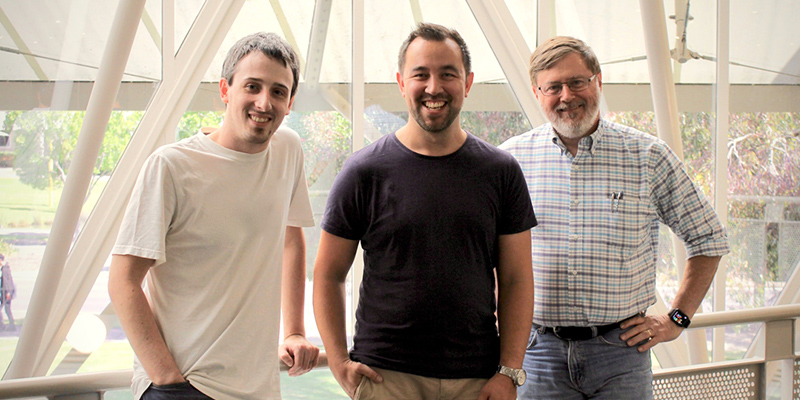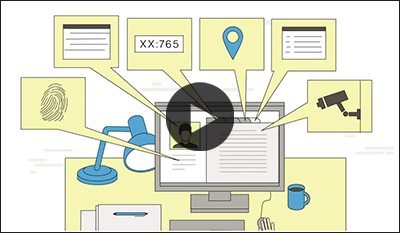Storytelling technology to revolutionise criminal convictions
 TECHNOLOGY AND ENGINEERING UniSA researchers Dr James Walsh, Dr Andrew Cunningham and Professor Bruce Thomas helped develop narrative visualisation technology which is now being taken to the commercial market by a spinout company.
TECHNOLOGY AND ENGINEERING UniSA researchers Dr James Walsh, Dr Andrew Cunningham and Professor Bruce Thomas helped develop narrative visualisation technology which is now being taken to the commercial market by a spinout company.> Anti-terrorism data startup secures $4m for international expansion
Imagine a system that could assemble the thousands of pieces of evidence from a criminal case into a single, cohesive digital view, making it dramatically easier for investigators and prosecutors to convict criminals.
This game-changing technology, called narrative visualisation, has been developed by UniSA researchers Dr Andrew Cunningham, Dr James Walsh and Professor Bruce Thomas in collaboration with the Data to Decisions Cooperative Research Centre (D2D CRC). The system provides a simple way for agents and prosecutors to explore and analyse information from a criminal case – so they no longer need to manually trawl through large amounts of paper and electronic records.
The Data to Decisions CRC was established in 2014 with a grant of $25 million and an additional $70 million in participant funding over five years. It wrapped up on 30 June after successfully bringing together researchers and industry to tackle big data challenges facing Australia's national security agencies, winning numerous awards and developing four major national security and big data programs which are now being commercialised through spinout companies including Fivecast and NQRY.
The narrative visualisation technology is being taken to the commercial market by a third spinout, process automation company Genix Ventures. The technology helps investigators and prosecutors make sense of the deluge of multimedia data or evidence in a criminal case, compiling the information and facts as a visual story.
“Studies have shown that people best understand information as a narrative,” Dr Cunningham says.
“The narrative visualisation technology conveys a narrative by describing an investigation from the initial reporting of a crime to the final prosecution, highlighting important dates, times, people and events complimented by visual evidence and other important information.
“This is all powered by a narrative engine that understands the wider context of the data, and how it relates to that narrative.”
The bottom line is that agents can view a criminal case with a focus on the storylines of the people involved, instead of being limited by the chronological order of information. This enables shared understanding between investigators and prosecutors, leading to faster and more consistent outcomes.
D2D CRC Chief Executive Officer Sanjay Mazumdar says that recognition of the difficulties with data management, shared understanding and insight, consistently emerged from the CRC’s conversations with state and federal law enforcement agencies.
“We continued to hear that making sense of the deluge of information was a prohibitively complex process,” Mazumdar says.
“Narrative visualisation technology removes the factors that regularly overwhelm investigators needing to manage literally thousands of pieces of data and creates a single, interactive view of the entire investigation.
“This is a real game changer for shared understanding of complex scenarios.”
The work won the 2018 Australian Information Industry Association (AIIA) award for best research and development project in SA, and a merit nationally the same year.
Work to commercialise the technology will now be pursued by D2D CRC partner Genix Ventures with the aim of extending the technology beyond law enforcement to other data-intensive sectors.
Genix Ventures managing director Steve Godinho says the technology is “an exciting innovation that will have a real impact in the Australian law enforcement arena”.
“But Genix also sees enormous potential for the technology to be used to streamline decision making in government agencies and industry, and this will be a key focus of our commercialisation activities,” Godinho says.
Anti-terrorism data startup secures $4m for international expansion
 Fivecast provides threat analytics for the law enforcement, national security and corporate security sectors.
Fivecast provides threat analytics for the law enforcement, national security and corporate security sectors.Another D2D CRC spinout company, Fivecast, is using publicly available data from social media platforms to provide insights for workers in law enforcement, defence and national intelligence.
The FiveCast Insight platform uses automation to filter that information, making it directly helpful for the agency it’s serving, a process CEO Dr Brenton Cooper likens to finding a needle in a haystack.
“We look in places like forums, chatrooms, even the dark web, for threats that might be of interest to law enforcement or intelligence. We then apply AI to that data to find the bits that are of interest to them,” he told SmartCompany.
The startup’s software was used by agencies in the wake of the Christchurch massacre, and to protect the 2018 Commonwealth Games from terrorism threats.
“Using AI, the product generates efficiencies in the collection and analysis of big data that simply haven’t been possible before now,” Dr Cooper says.
“We’re talking about time-critical law enforcement and national security activities; efficiencies in this realm are game changing on a global scale.”
The company’s next goal is significantly bigger — it has the US’s 17,000 law enforcement agencies in its sights. Fivecast has secured a $4 million investment from the CSIRO Innovation Fund and the South Australian Venture Capital Fund to help drive international expansion and product growth.
Other Stories
- Using free public wifi could be putting you at risk of cyber attack
- Why it’s time to start thinking about batteries for your rooftop solar
- Storytelling technology to revolutionise criminal convictions
- Being environmentally responsible is good for the bottom line
- From the Vice Chancellor
- Achievements and Announcements
- Problematic sexual behaviour among young children raises concerns for teachers
- UniSA thriving in World Young University rankings
- Mobiles can help you better manage your medications
- Hoodie culture a winner for Aboriginal artist
- War veterans tap into their creative side at UniSA
- We asked a UniSA student to review MOD.’s new exhibition
- What it’s like for a student from Peru to study in Adelaide
- The latest books from UniSA researchers
- Maple Leaf, microengineering school and Refugee Week events





